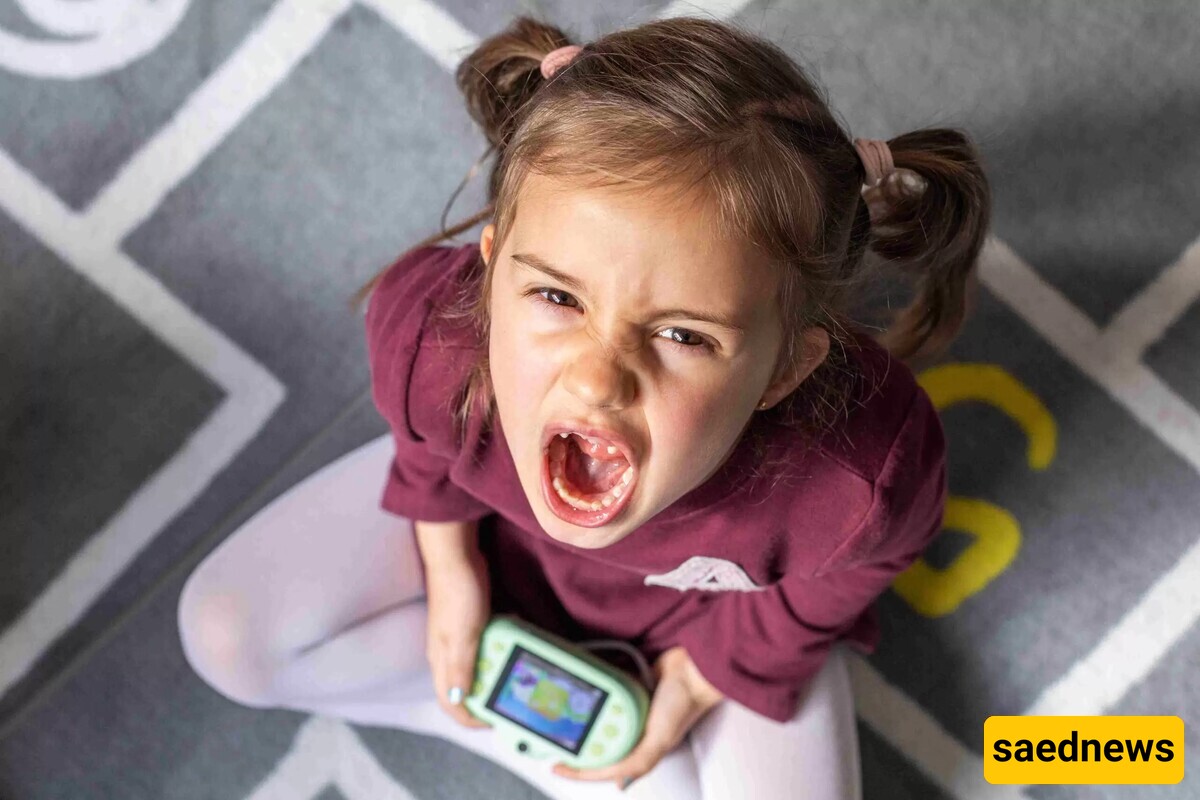Saed News: Why does aggression occur in children, and what can be done about it? In this article, you will learn about the causes of anger and aggression in children aged three to eight and how to handle and manage their emotions.

What Causes Aggression in Children?
It may seem surprising, but aggression and aggressive behavior are a natural part of a child's development. Many children occasionally grab their classmates' toys, hit and kick them, or scream to the point of turning blue.
A young child is still learning various new skills, from using scissors to speaking in complex sentences. They can easily become frustrated when they struggle to achieve their goals, leading to aggressive reactions toward playmates.
If your child is attending daycare or preschool for the first time, they are also adjusting to being away from home. If they feel upset, neglected, or ignored, they may retaliate by pushing another child who bothers them.
At other times, your child may simply be tired or hungry and not know how to cope, so they respond by biting, hitting, or throwing a tantrum.
Even older elementary school children may struggle to control their emotions. Learning difficulties can make listening, focusing, or reading challenging, disrupting their performance in school and causing deep frustration. A traumatic experience, such as parental divorce or the illness of a loved one, can also trigger overwhelming anger and distress.
No matter the cause of your child's aggression, they will likely outgrow it as they improve their ability to use words instead of fists to solve problems. However, the key is to help them understand as soon as possible that discussing disagreements is more effective than pulling a friend's or sibling’s hair.
What to Do About Your Child's Aggression?
Tantrums and outbursts are inevitable as children grow. But how should you handle them?
1. Be a Good Role Model
No matter how angry you are, try not to yell, hit your child, or call them a bad child. These actions do not encourage positive behavior changes; instead, they teach them that verbal and physical aggression is the best response to anger. Instead, model self-control and, if necessary, intervene calmly.
2. Respond Quickly
When you see your child about to act aggressively, intervene immediately rather than waiting for repeated offenses before reacting. If your child has already been reprimanded several times in an hour, it is still important to consistently show them that their actions are wrong.
3. Remove Them from the Situation
Take them away from the situation for a short break. For a preschooler, a three-to-four-minute timeout is enough. For older children, consider removing privileges, such as reducing screen time or deducting from their allowance. The goal is for them to associate aggressive behavior with consequences—understanding that hitting or screaming results in losing something they enjoy but not losing your love. Children should always know that their parents love them unconditionally.
4. Be Consistent in Your Response
As much as possible, respond to aggressive behavior in the same way each time. The more predictable your reactions are, the faster your child will recognize and expect them. Eventually, they will learn that misbehavior leads to losing a privilege, which is the first step toward self-control. Even if their actions embarrass you in public, stay consistent with your approach.
5. Talk to Your Child
Let your child calm down and then discuss what happened in a composed manner. The best time to do this is after they have settled down but before they forget the incident—ideally, 30 minutes to an hour later. Ask them if they can explain what triggered their anger. For example, "Why did you get so upset with your friend?"
6. Suggest Healthy Ways to Express Anger
Explain that feeling angry is normal and that you understand their emotions. However, emphasize that pushing, hitting, kicking, or biting is unacceptable. Offer better ways to express anger, such as kicking a ball, punching a pillow, seeking an adult’s help, or simply telling their friend, "I'm really mad at you because you took my book."
7. Try Positive Time-In Instead of Time-Out
Another approach to helping children manage emotions is using "positive time-in" instead of "time-out." This means that whenever your child gets angry, stop what you are doing and ask them to sit with you quietly for a moment. If they allow it, put your arm around them or hold their hand. After a few minutes of calmness, briefly discuss what happened and how they could have handled their anger differently. The goal is to teach them to recognize and understand their emotions while considering alternative ways to express their feelings. This is also an opportunity to teach them to avoid people or situations that provoke anger until they learn to manage their reactions better. Reading books on anger management can also help.
8. Recognize Good Behavior
Instead of only paying attention when your child misbehaves, make an effort to notice and acknowledge their good behavior. For example, praise them when they take turns instead of grabbing their sibling's tablet or when they let another child use the swing. Give balanced and genuine compliments when they behave well.
9. Express Your Pride in Them
Show your child that self-control and conflict resolution bring greater satisfaction than pushing or hitting others. Consider putting a special calendar on the fridge or a bulletin board in their room, and reward them with a colorful sticker each time they successfully manage their anger.
10. Teach Responsibility
If your child's aggression causes damage to property or creates a mess, they should help fix it. For example, they can glue a broken toy back together or clean up the biscuits or Legos they threw in frustration. Frame this as a natural consequence of their actions rather than a punishment—just as anyone of any age must fix what they break.
11. Teach Them to Apologize
Make sure your child understands that they should say "sorry" when they cross a line, even if you need to gently guide them toward the offended person and say it for them at first. Their apologies may seem insincere at first, but over time, they will learn the importance of genuine apologies. Set a good example yourself.
12. Be Smart About Screen Time
Seemingly innocent cartoons and children's media can contain a lot of yelling, threats, pushing, and hitting. If your child is prone to aggression, monitor their screen time by watching shows with them in a relaxed way—without being a strict, intimidating observer. Discuss the content afterward and choose age-appropriate, high-quality media. Limit screen time to one hour per day.
13. Seek Professional Help if Needed
Some children struggle with aggression more than others. If your child's aggressive behavior is frequent and intense, interferes with school or structured activities, and results in physical attacks on children or adults, consult a knowledgeable doctor. Together, you can determine whether they need a psychologist or psychiatrist. Sometimes, undiagnosed learning or behavioral disorders cause frustration and anger, or family and emotional issues play a role. Whatever the underlying issue, a counselor can help your child identify and control the emotions that trigger aggression.
While professional help may not always be necessary, knowing that you don’t have to face this challenge alone can be reassuring if your child needs support.



